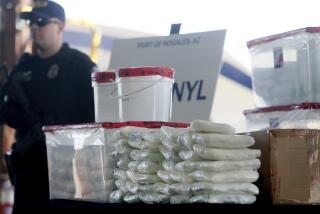43 Nations Sign U.N. Pact on Fighting Drugs
- Share via
VIENNA — Forty-three countries Tuesday signed a U.N. convention against drug trafficking that will enable them to freeze and confiscate bank accounts and extradite suspects.
The convention commits signatories to toughening their laws against drug dealing and providing mutual legal assistance in fighting international narcotics rings.
“We are sending a clear message to those involved in international drug trafficking that there is no safe haven in the world today for their illegal activities,” U.S. Atty. Gen. Dick Thornburgh told a news conference.
Sixty-three other nations participating in the closed-door gathering adopted the convention by consensus, according to U.N. spokesman Axel Wuestenhage.
The new document, known formally as the Convention Against Illicit Traffic in Narcotic Drugs and Psychotropic Substances, complements the 1961 Convention on Narcotic Drugs signed by 121 countries and the 1971 Convention on Psychotropic Substances, so far ratified by 88 countries.
It may take several years for the new convention to become legally binding. To have legal force, it must be ratified by parliaments or other national bodies in the signatory countries, then given to the U.N. secretary general for notification.
The signatories are among 106 countries that attended a monthlong conference organized by the Vienna-based U.N. Narcotics Control Board.
“This convention represents a recognition that no one nation alone can successfully attack the scourge of drug trafficking,” Thornburgh said.
The convention, the result of four years of negotiations, calls for laws enabling governments to trace, freeze or seize bank accounts or property of suspected traffickers.
More to Read
Sign up for Essential California
The most important California stories and recommendations in your inbox every morning.
You may occasionally receive promotional content from the Los Angeles Times.










